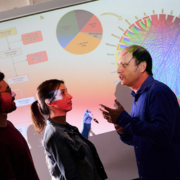Research suggests new cure for alcoholism
TAU-led research finds ways of reducing alcohol addiction in rats
Israeli scientists have succeeded in achieving a breakthrough that could help treat alcoholism and prevent relapse. In a paper published in Nature Neuroscience, researchers say they have managed to selectively delete memories related to and triggering alcohol consumption, without damaging other, unrelated memories.
The research was headed by Prof. Dorit Ron of the Ernest Gallo Clinic and Research Center at UC San Francisco and Dr. Segev Barak, of the School of Psychological Sciences and the Sagol School of Neuroscience at Tel Aviv University.
New Treatment Strategy
According to Prof. Barak, "alcohol and drug addiction are a disease with a biological basis, causing severe financial and health damages. 70-80 percent of addicts are back on drugs or alcohol with a year of the rehabilitation. The major factors contributing to this high rate include those obstinate memories, associated objects and places with alcohol, such as pubs, bottles and, of course, scents and tastes characteristic to alcohol. The new finding might, in theory, delete these memories and constitute an innovative treatment strategy."
Sense Memory
During the experiment rats could choose between drinking water or a solution of 20% alcohol. Prof. Barak said the researchers tried to "mimic the experience of humans who could choose between alcohol and other beverages, who chose to drink alcohol without being forced to do so. In such experiments, usually 10-20 percent of the rats drink a small amount of alcohol and do not develop signs of addiction; these were not included in the current study."
The rats continued to receive alcohol and water for two months, with those consuming huge amounts of alcohol being used as a model of alcoholic addiction. At the next stage of the experiment the rats were trained to receive alcohol by pressing a lever. After a 10-day abstention, researches awoke the "alcohol memory" of the rats by presenting the scent of alcohol and miniscule portions. The rats then tried to self-administer shots of alcohol.
Scans of the rats' brains revealed that alcohol-related memories activate a protein complex called mTORC1, responsible for the creation of new proteins at the connection points between the brain's neurons, and that has an important role in designing memories.
Researchers concluded that alcohol-related memories activated the protein in specific parts of the frontal lobe connected to memory processing, which is responsible for emotional memories and is involved in symptoms of alcohol withdrawal. Prof. Barak said that such a "focused and strong activation of a protein in a specific part of the brain is very rare. We immediately understood something important was happening there."
Researchers then tried to neutralize the activity of the protein by injecting Rapamycin, a FDA-approved drug for humans who have rejected transplants. When administered, it moved towards the areas associated with alcoholism and prevented the activation of a process initiated by mTORC1.






